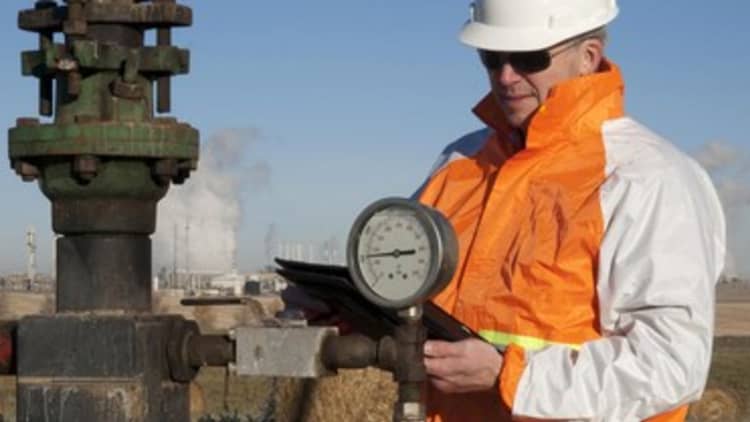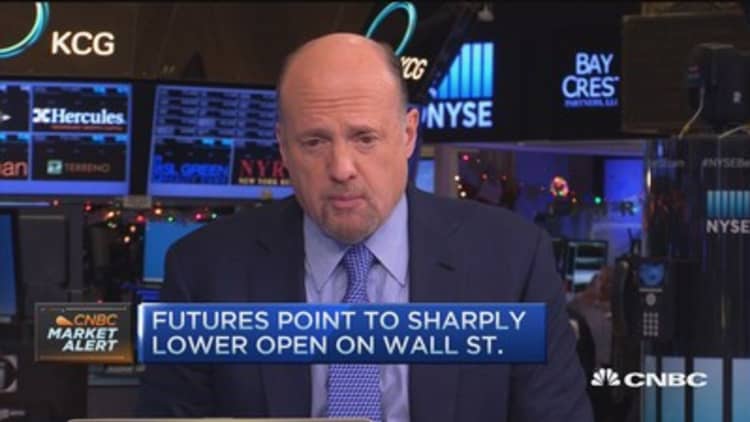


Oil prices settled slightly lower on Tuesday but not before plumbing new lows seen during the 2009 financial crisis as an intensifying supply glut sparked fears the world will run out of storage for crude.
Brent and U.S. crude futures sunk beneath $40 a barrel, hitting February 2009 levels and extending Monday's 6 percent rout, before paring losses on what traders said was most likely short-covering.
Internationally traded Brent futures were down 44 cents at $40.28 a barrel by 2:33 p.m. EDT, after setting a session low at $39.81.
U.S. crude settled 14 cents lower, or 0.37 percent, at $37.51 a barrel.
Gasoline futures was also little changed after earlier falling to near 7-year lows in New York trading as the selloff in crude oil extended to a relatively stable spot on the U.S. petroleum complex.
"It's most likely shorts taking profit and exiting their positions," said Pete Donovan, broker at New York's Liquidity Energy, referring to the market's rebound.
"Fundamentals remain bleak but the question is also how much more aggressive can sellers be when the downside becomes more limited?"
Oil's sharpest selloff since summer came after Friday's meeting of the Organization of the Petroleum Exporting Countries (OPEC) which all but abandoned price support for crude through production cutting the group once resorted to.
OPEC also failed for the first time in decades to agree to a production ceiling. Instead, its core members, led by top crude exporter Saudi Arabia, appeared to be readying for new battles for share in a market already heavily oversupplied and consuming almost 2 million barrels per day less than it is producing. Saudi rivals Iran and Iraq have also promised to ramp up output and exports next year.
"OPEC has lost control of the oil market and unless something fundamental changes that causes demand to overtake the oversupply in the market, the path of least resistance is the 2008 lows of $35-$38," said Michael Hewson, chief market analyst at CMC Markets.
Banks such as Goldman Sachs have said oil could fall to as low as $20 per barrel as the world might run out of storage to place unwanted crude. World oil stockpiles are at a record, according to the International Energy Agency.
In yet another indication of fierce market battles, trading sources said Saudi Arabia was shipping more crude oil to Asia over the last two months of the year.
On the demand side, China's appetite for cheap oil was helping to support prices as the government looks to build up its strategic reserves.
China's crude oil imports for the first 11 months of the year rose 8.7 percent to 6.61 million barrels per day while its November crude imports grew 7.6 percent from the same month a year ago, according to preliminary customs data released Tuesday.
China's November new vehicle sales also jumped 17.6 percent over the same period.
With crude prices near record lows, China is seen as likely to double its strategic crude oil purchases in 2016, adding some 70-90 million barrels to its strategic petroleum reserves (SPR).
"There is no doubt that weak commodity prices have induced some opportunistic buying. This should be mildly supportive for commodity markets," ANZ bank said.
But it added that given the country's slowing economy, "we still don't expect to see Chinese consumers start to aggressively restock with the outlook remaining weak."
At the same time crude imports are rising, the preliminary customs figures show China's exports of refined products surged to 4.1 million tonnes in November, up 68 percent year-on-year. If the final numbers released later this month confirm the data, that would mean record exports of fuel from the country.






